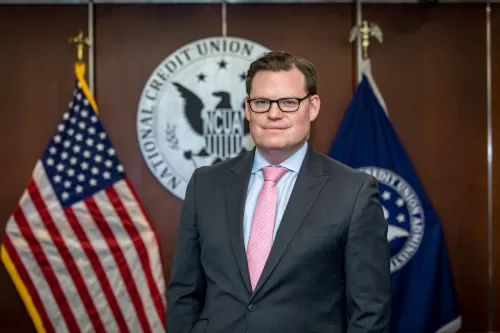NCUA Vice Chairman Kyle S. Hauptman at the NCUA's headquarters in Alexandria, Virginia.
As Prepared for Delivery on December 16, 2021
Thank you, Mr. Chairman and thank you, Eugene, and the team in the Office of the Chief Financial Officer for your efforts in preparing the proposed budget for 2022-2023. I’d also like to thank, Larry Fazio, and my fellow Board members for their willingness to work together to find common ground.
During the budget hearing last week, I said the draft budget is just that, a draft and I expected it to evolve before it was voted on. One of my biggest concerns was headcount. The proposed number of 48 new FTEs represented more than $66 million over ten years, and that was without factoring in pay raises and inflation.
In my first board meeting just a year ago, and almost every board meeting since, I stated that:
We should know that every dollar we take is obviously the money of credit union members. Every bit we spend could be food on some family's table. It could be a birthday present for a kid that doesn't have much or a bus ticket to go see a sick relative for the final time. We need to be able to look them in the eye and tell them that what we spent was worth it. We must not … demand money from hardworking people and say, we're going to spend it better than they will.
So today, I’d just like to reiterate how high the bar should be for us to take money from credit union members. Every dollar the NCUA spends is no longer at a credit union earning a return. When we take a dollar from a credit union, the cost isn’t just that one dollar. The cost is also the future earnings that dollar could have earned if it stayed at a credit union helping a member. So, it is in the spirit we should approach our budget process.
I am pleased that the final budget we are discussing today is lowered considerably in both headcount and total spending. The revised comparison to 2021 (without carryover factored into either year) is a reduction of $1.9 million (Down 0.6 percent). As I also said last year, any reduction in a government budget is remarkable. I applaud staff and management for working with the Board to achieve this.
The revised budget places more emphasis on assisting small credit unions. I think we all agree this is needed. As we emerge from the pandemic, smaller institutions with fewer resources will benefit from immediate and effective support. No matter how well-intentioned, home office staff in Alexandria aren’t always equipped with the intimate knowledge needed to act quickly to assist a particular credit union. The people closest to the challenges — field examiners — are. But that takes resources, and I am grateful for the addition of 3,000 examiner hours dedicated to working with small credit unions. I’m especially pleased because this strategy allows us to track our effectiveness.
Measuring the effectiveness of the dollars we spend is important. Credit unions must carefully consider the return on investment of their resources — we must do the same.
Finally, I support Board Member Hood’s call to return excess funds in the Operating Budget back to the credit unions. The build-up of cash and net fund balance/reserves in the Operating Fund is money raised by NCUA’s operating fee to credit unions. This annual fee is intended to pay the agency’s annual expenses. It wasn’t intended to build reserves.
We all appreciate the effort to conserve budget dollars, but we should work toward a consistent method for returning excess funds when they reach certain levels. Returning $15 million of the excess cash to offset the operating budget is a step in the right direction.
Thank you, Mr. Chairman. I have no further comments. I do have a few questions for Eugene.
Question: I expressed my concern last week that the amount of time the budget was out for public comment was too short. When this process is rushed, it can give the appearance that the public comment really is not welcome. What are you going to do to help ensure this does not repeat next year?
Question: Also, how would you characterize the amount and types of comments received this year, as compared to last year?
Question: The budget is presented as a two-year budget. What can we expect to happen prior to year two of this budget, for 2023? Has year two of the two-year budget ever gone into effect without the Board revising it?
Thank you, Mr. Chairman. That concludes my remarks.




